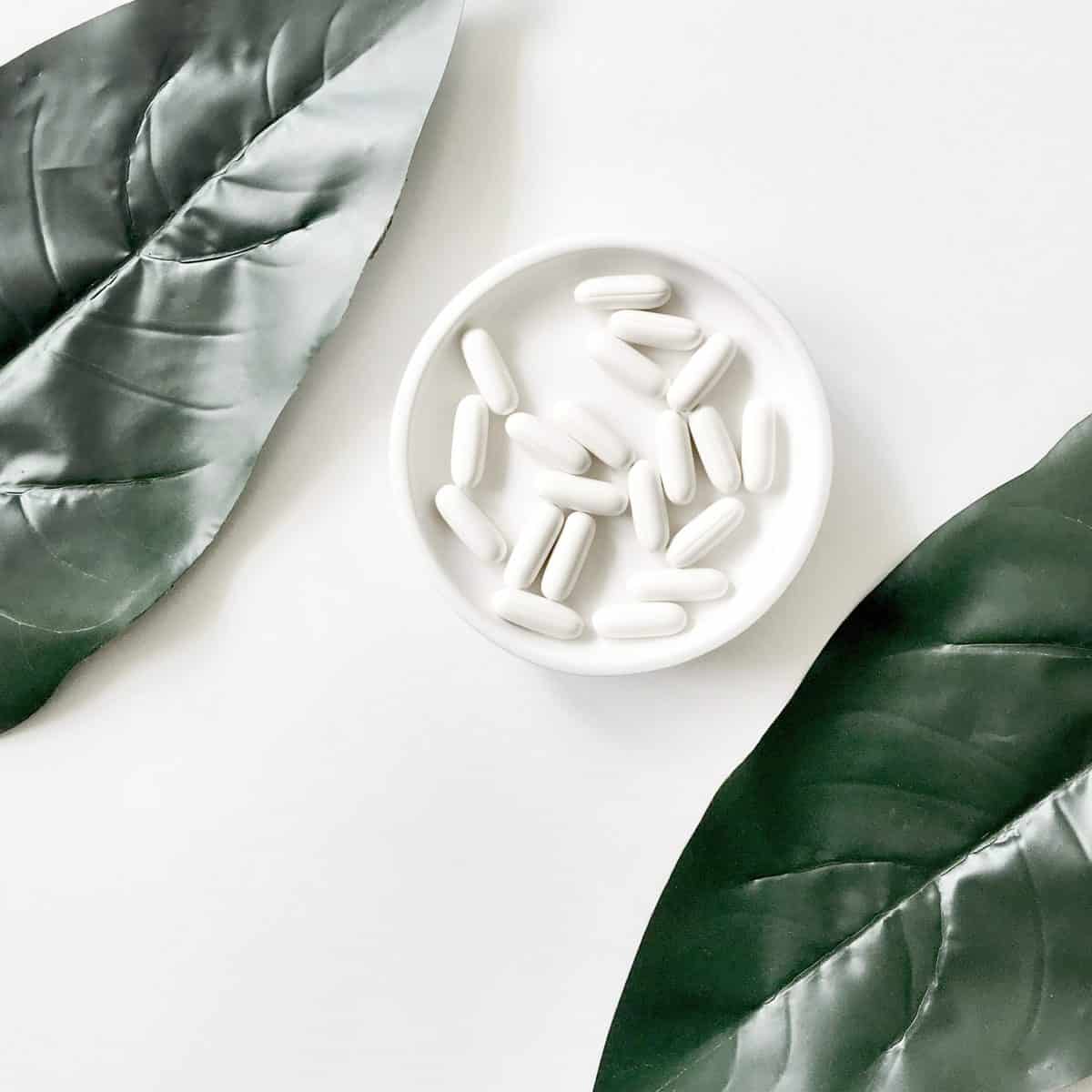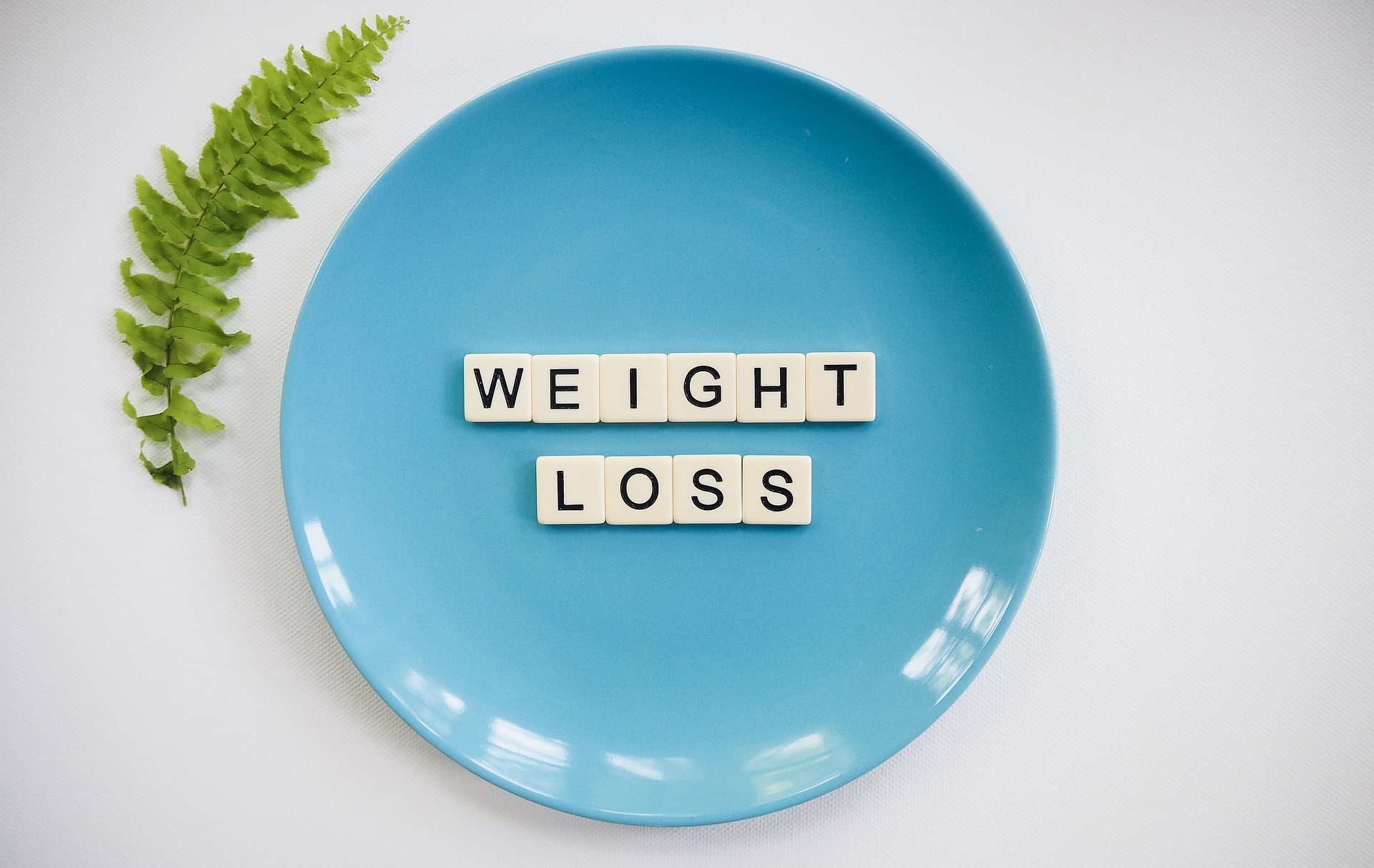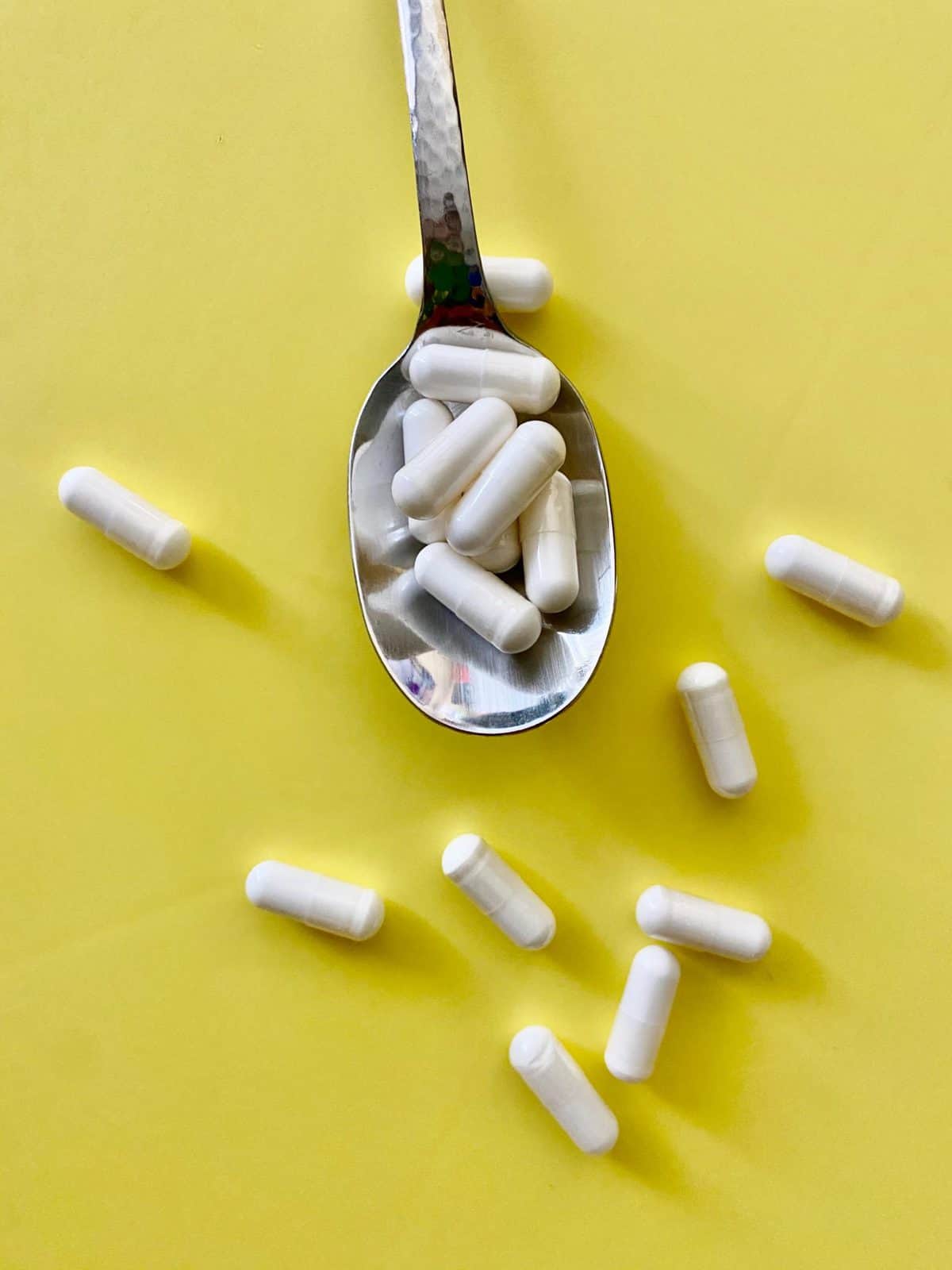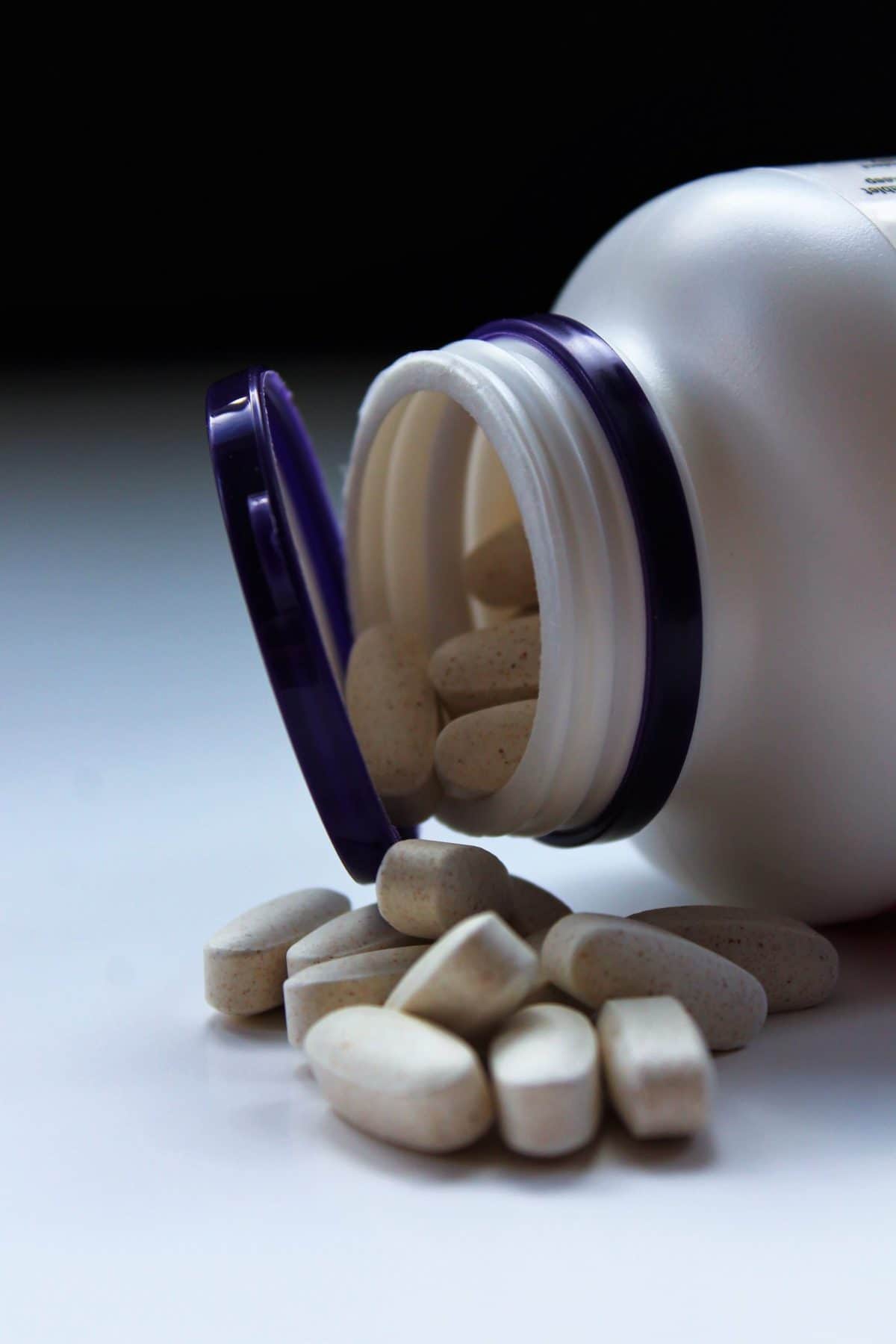We look at the research on the best probiotic strains for specific concerns including probiotics for weight loss, IBS, constipation, and more.
Since discussing probiotics for kids and babies in a previous blog post, we’ve received a lot of requests to review probiotics for adults, and which specific strains of probiotics are best for weight loss, IBS, constipation, anxiety and more. As we mentioned in the previous post, probiotics naturally live in our guts, containing both “good” and “bad” live bacteria and/or yeasts. The World Health Organization defines probiotics as “live microorganisms which when administered in adequate amounts confer a health benefit on the host.” While these bacteria and/or yeasts occur naturally in a wide range of food, we also can find them in supplemental form to help increase the “good” bacteria in our bodies to balance or restore a healthy gut microbiota.
Strains of Probiotics

There are a variety of probiotic strains that exist in both food and supplemental sources, and research has shown that specific strains may be more beneficial in treating specific health concerns – aka there is no one size fits all for probiotics and their intended use. So for example, there is some research to show that Bifidobacteria may be beneficial in the treatment of constipation and Irritable Bowel Syndrome (IBS) symptoms, as well as aid in weight management. We discuss the research on this strain and its impact on IBS in more detail below, along with several other health conditions and associated strains that have been shown to be beneficial. So keep reading to find out more!
In terms of the supplemental probiotics we find in drug stores, the most common types of bacteria used are Bifidobacteria and Lactobacillus, as well as the yeast, Saccharomyces. Some of the probiotic supplements available in stores are single-strains, while others are multi-strains or multi-species. For general health, research suggests that multi-strains and multi-species (meaning two or more probiotic strains or species in a single supplement) are more effective than single-strains. This is because the mixed bacteria and/or yeast complement each other and provide synergistic health properties, thereby maximizing the effectiveness of the probiotic supplement.
Best Probiotics for Adults
There are many different probiotic supplements on the market targeted at treating and/or preventing a wide variety of health conditions and concerns – from treating constipation to potentially aiding in weight loss or management. But does the research support these claims? And what specific probiotic strains are most effective for these health conditions? Let’s take a look at what the evidence has to say on using specific probiotics.
Use of Probiotics for Constipation
We all know how uncomfortable and frustrating constipation can be and there are a number of reasons why one may experience constipation – including medications, stress, dehydration, and eating a low-fibre diet. There are also a number of ways to help relieve constipation and make stools easier to pass. One of which is the regular intake of probiotics. Many probiotics on the market claim to help treat constipation and often contain the strains – L. reuteri and L. casei. In terms of the effectiveness of the L. reuteri strain on the treatment of constipation, a 2014 randomized control trial (RCT) found that L. reuteri was effective at improving bowel movement frequency. However, the study did not find a difference in stool consistency.
As for the effectiveness of L. casei, a 2014 systematic review and meta-analysis looking at the effects of probiotics on constipation in adults, found that L. casei was not effective at improving stool frequency or consistency. Instead, this study found that the B. lactis strain significantly reduced gut transit time by 12.4 hours. It also found that B. lactis increased stool frequency by 1.3 bowel movements per week, and improved stool consistency. Therefore, the L. reuteri strain may be effective at improving constipation, but the B. lactis may be a more effective option for most people.
Example: Activia® Shot Probiotic Drink CFU/Dose: 1B/serving, Dose/day: 1-3 servings (B. lactis)
Use of Probiotics for Weight Loss / Management
There are probiotics on the market that claim to aid in weight loss by helping to reduce body weight, body fat mass and waist circumference. Probiotics for weight management is a new and up-incoming area of research and unfortunately, to date, there is a lack of research studies to support these claims. So far, a 2015 systematic review and meta-analysis looked at whether or not supplemental probiotics and probiotics from food had any effect on weight loss and found that probiotics for weight loss have limited efficacy in decreasing body weight and BMI.
However, a more recent RCT, published in 2016, found that B. lactis reduced body weight compared to placebo. That being said, this study only included 134 participants and thereby stated that more clinical trials on a larger study sample is needed to generalize these findings to a wider population. Similar to our recommendation on probiotics for anxiety, it is possible that probiotics may work for you and your unique needs. However, because research is still in its early stages, whether or not there are best probiotics for weight loss is up for debate. This is compounded by the fact that long term weight loss efforts are often met with compensatory mechanisms in the body (read about that here), so it’s important to work with a registered dietitian or medical professional to assess whether or not probiotics are right for you.
Example: UltraFlora Control CFU/Dose: 10B/capsule, Dose/day: 1 capsule (B. lactis) – approved by Health Canada
Use of Probiotics for IBS (Irritable Bowel Syndrome)
Irritable Bowel Syndrome (IBS) is a chronic condition that affects the large intestine. Symptoms of IBS include cramping, abdominal pain, bloating, gas, diarrhea and/or constipation. A systematic review published in 2019 looking at whether probiotics supplements improve IBS symptoms found that, overall, there was a beneficial effect from using multi-strain supplements for at least 8 weeks. However, none of the trials included in the review used the same probiotic mixtures. That being said, of the trials that reported beneficial effects of multi-strain probiotics, L. acidophilus was the most commonly represented probiotic, followed by S. thermophilus, B. breve and B. longum.
Another systematic review and meta-analysis published in 2019 looking at the efficacy and safety of probiotics for IBS concluded that probiotics can significantly improve the overall symptoms of IBS and abdominal pain. Similarly, the review also found that combinations of probiotics, rather than single-strains, appear to be more effective. However, similar to the study mentioned above, the paper stated that it was unclear what particular combination of probiotic species and strains were more likely to be effective, as all the studies included in the review used different combinations of strains and doses. The review concluded that Lactobacillus and Saccharomyces showed little or no beneficial effect, but that there was a trend toward a beneficial effect of Bifidobacterium.
These two studies show that the current research is still mixed in this area. It is important to also note that different strains may be more effective in treating IBS for some people than others. With that said, it may be beneficial to work with a registered dietitian or medical professional when trialing different probiotic strains to find one that works for you.
Example: Visbiome™ CFU/Dose: 450B/sachet, Dose/day: 1-4 sachets (VSL#3 – L. acidophilus, L. casei, L. bulgaricus, L. plantarum, B. longum, B. infantis, B. breve and S. thermophilus) – approved by Health Canada
Example: Align® CFU/dose: 1B/capsule, Dose/day: 1 capsule (B. longum) – approved by Health Canada
Use of Probiotics for Antibiotic-Associated Diarrhea Prevention
Bacterial infections will often warrant the use of antibiotics as a form of treatment. However, the downside of antibiotics is that even though they may kill the “bad” bacteria causing the infection, it doesn’t discriminate. Meaning – antibiotics will also kill a number of “good” bacteria and thereby disrupt the bacterial balance in the gut. This can lead to antibiotic-associated diarrhea (AAD) – which is the passing of loose, watery stools multiple times a day after the use of antibiotics. A meta-analysis published in 2016 looking at whether probiotics reduce the risk of AAD found favourable effects of probiotics in adults, but not the elderly. These results were found regardless of the intended use of the antibiotic prescription. The studies included in the analysis used different strains and doses of probiotics. That being said, among the different strains of probiotics evaluated, L. casei, L. acidophilus and S. boulardii more frequently showed favourable effects on AAD.
Another systematic review and meta-analysis published in 2010 found that S. boulardii was significantly protective for AAD and therefore recommended its use.
Example: Florastor® CFU/Dose: 5B/sachet or capsule, Dose/day: 1-2 sachets or capsules (S. boulardii) – approved by Health Canada
Use of Probiotics for Clostridium Difficile Associated Diarrhea Prevention
As mentioned above, antibiotics can disturb the balance of bacteria in the gut, which can result in diarrhea and other symptoms. Clostridium difficile is a dangerous organism that may colonize the gut when the normal healthy balance of bacteria has been disturbed. C. difficile produces irritating chemicals that damage the bowel wall and trigger inflammation, known as colitis. Symptoms include abdominal pain, cramps, fever and diarrhea. A systematic review published in 2017 found that when probiotics are given with antibiotics, the risk of developing C. difficile associated diarrhea (CDAD) is reduced by 60%. More specifically, the review found that S. boulardii or L. acidophilus plus L. casei prevents CDAD at a dose of 10 to 50 billion CFUs per day.
Example: Bio-K+® Strong Capsules CFU/Dose: 50B/capsule, Dose/day: 1-2 capsules (L. acidophilus, L. casei, L. rhamnosus) – approved by Health Canada
Example: Florastor® CFU/Dose: 5B/sachet or capsule, Dose/day: 1-2 sachets or capsules (S. boulardii) – approved by Health Canada
Use of Probiotics for Travelers’ Diarrhea
Travelers’ diarrhea (TD) is a common side effect when visiting developing countries due to eating or drinking contaminated food or water. Research has shown that as many as 38-79% of people may develop TD while travelling. A systematic review and meta-analysis published in 2019 looked at whether probiotics are effective in the prevention of TD. The study found that not all probiotic strains were effective for preventing TD and highlighted that strain-specificity is an important factor when choosing an effective probiotic. Only one probiotic, S. boulardii, was significantly effective for the prevention of TD. So keep this in mind for when COVID traveling restrictions are lifted!
Example: Florastor® CFU/Dose: 5B/sachet or capsule, Dose/day: 1-2 sachets or capsules (S. boulardii) – approved by Health Canada
Use of Probiotics for Helicobacter Pylori (Adjunct to Standard Eradication Therapy)
Helicobacter pylori is a type of bacteria that can colonize in the stomach or upper part of the small intestine if passed through direct contact, such as through saliva, vomit or fecal matter, or from contaminated food and water. If left untreated, this can lead to numerous gastrointestinal diseases including peptic ulcer disease and gastric cancer. Triple therapy is the gold standard treatment regimen for H. pylori eradication and combines the use of antibiotics (clarithromycin and either amoxicillin or metronidazole) and a proton pump inhibitor drug for 7 to 14 days. However, the success rate and efficacy of triple therapy has been declining.
A systematic review and meta-analysis published in 2010 looking at S. boulardii found that there was no significant difference in H. pylori eradication. Although, significantly fewer patients reported epigastric distress and lower global dyspepsia symptoms scores, compared with placebo. This indicates that S. boulardii may not be effective in eradicating H. pylori itself, but it is effective in reducing the side-effects of the standard triple therapy.
That being said, a meta-analysis published in 2016 found that the addition of probiotics to the triple therapy was associated with a 13.8% increase in the chance of eradicating H. pylori infection compared to triple therapy alone. Interestingly, the analysis found that there was no significant difference observed in efficacy between the various types of probiotics. Both single strains of Lactobacillus, Bifidobacterium and Saccharomyces, along with mixtures of these three probiotics all appeared to be beneficial in H. pylori eradication. The analysis does call for further studies to identify the optimal probiotic species and dose. It is important to note that the analysis does not recommend solely using probiotics to eradicate H. pylori, as probiotics only help to reduce bacterial load when used in conjunction with triple therapy.
Example: Example: Florastor® CFU/Dose: 5B/sachet or capsule, Dose/day: 1-2 sachets or capsules (S. boulardii)
Use of Probiotics for Anxiety
Research has shown that there exists an important relationship between our gut and our brain – aka the gut-brain axis. New and exciting research has begun to take a deep look at this relationship, with some studies showing that probiotics may play an important role in not only supporting a healthy gut but a healthy brain, as well. For example, a 2017 meta-analysis looking at the efficacy of probiotics on anxiety found that probiotics significantly decreased anxiety compared to controls. More specifically, a 2011 study included in the analysis found that L. helveticus and B. longum taken in combination displayed anxiety reducing activity in rats and beneficial psychological effects in healthy human volunteers. However, the meta-analysis concluded that more studies are needed to assess the specific probiotic strains, doses, and treatment periods most beneficial for anxiety. Therefore, the analysis did not recommend specific bacterial strains.
That being said, another meta-analysis published one year later, in 2018, found that the evidence of probiotics in treating anxiety is insufficient. This analysis showed no significant difference between probiotics and the placebo in alleviating anxiety symptoms. The paper concluded that more reliable evidence from clinical trials is needed before a case can be made for promoting the use of probiotics for anxiety treatment.
These two conflicting analyses show that research on the efficacy of probiotics for mood, termed “psychobiotics,” is still in the preliminary stages. Therefore, more high-quality research studies are needed to determine if probiotics effectively reduce anxiety. That being said, if you are living with anxiety and are curious about probiotics, work with a registered dietitian or medical professional to see if taking a probiotic works for you and your unique needs. Also, as a reminder, probiotics are not suggested to be used as a substitute for standard treatment.
Example: Probiotics Sticks CFU/Dose: 3B/stick, Dose/day: 1 stick (B. longum, L. helveticus) – approved by Health Canada
Probiotic Supplements vs Foods
Probiotic supplements can be purchased in liquid, powder, capsule or pill form. Probiotics are also both found naturally and supplemented in foods such as kimchi, sauerkraut, kefir, tempeh, miso and probiotic enriched yogurt. While the probiotic load in food is not nearly as significant as in a supplement, there are a lot of added benefits to eating probiotic-rich foods over taking a supplement, as many of these foods are also rich in vitamins and nutrition.
For example, let’s take a look at probiotic yogurt. To be considered a probiotic yogurt in Canada, the stated serving size must contain a minimum level of 1 billion CFU. However, 1 billion CFU is not a therapeutic dose as it is far less than probiotic supplements which have upwards of 10 billion CFU. Quick and easy math tells us that you would need to consume upwards of 10 servings of probiotic yogurt to get the same amount of CFUs that are in one probiotic supplement. This would also mean that you would need to consume yogurt every single day. For more details on the probiotic food vs. supplement debate, check out our previous post here.
The takeaway message here is that you should aim to incorporate more probiotic-rich foods in your day-to-day to support your gut health. But if you struggle to incorporate these foods into your regular diet, or you require more support for your digestion or any other conditions we’ve discussed here – a probiotic supplement may be the way to go to help support your needs and overall health.
Are probiotics safe for adults?
Probiotic supplements are generally considered safe, as the microbes used in the supplements already exist naturally in the body. However, probiotics may trigger allergic reactions and may also cause mild stomach upset, diarrhea or flatulence and bloating for the first few days of use. To reduce the likelihood of these symptoms, it is recommended to start with a lower dose as the body adjusts. Individuals with a weakened immune system, critical illness and/or have recently undergone surgery may be at risk of infection, and, therefore, extra caution is recommended. Always talk to your healthcare provider before starting probiotic supplements, as well if side effects continue for more than a few weeks.
Are probiotics well regulated?
If you are interested, the regulation of probiotics was discussed at greater length in the previous post on probiotics for kids and babies. But here is a quick summary. Probiotics are available over-the-counter and are considered a natural health “dietary supplement” instead of a drug. In Canada, probiotics are subject to regulations and must have a product license. Probiotics with a natural product number (NPN), visible on the product label, have been assessed by Health Canada and are deemed safe, effective and of high quality. Next time you are at the store to purchase a probiotic supplement, make sure you look out for the NPN number as confirmation that the probiotic has been approved by Health Canada.
Bottom line on the Evidence on Probiotics for IBS, Weight Loss and More
Overall, the research suggests that probiotic supplements can help in treating constipation, improving symptoms of IBS, preventing antibiotic-associated diarrhea, C. difficile associated diarrhea D and traveler’s diarrhea, along with reducing the side-effects of H. pylori standard triple therapy. The research also shows promising, although preliminary, results in probiotic supplements possibly reducing anxiety and aiding in weight loss or management. If you are struggling with or wanting to prevent any of these health concerns, it would be beneficial to work with a registered dietitian or medical professional to help you choose the best probiotic strain for you. There are so many supplements on the market at varying CFUs and doses and your medical team can help you choose the most effective strain that is best suited for you and your unique needs.
Have you taken probiotics? Did you find it helped with any of the ailments we discussed? Leave me a comment below with your thoughts!
Contribution by: Christine Jauernig
Updated on May 12th, 2022

Abbey Sharp is a Registered Dietitian (RD), regulated by the Ontario College of Dietitians. She is a mom, YouTuber, Blogger, award winning cookbook author, media coach specializing in food and nutrition influencers, and a frequent contributor to national publications like Healthline and on national broadcast TV shows.












Micro Biotic Plus says
Great site, thanks! I really like it.
Micro Biotic Plus says
This website has given me useful information about best probiotic for constipation in the past.
Richard Snuffer says
there are so many PROBIOTICS online, how do you tell good from bad.
do you have recommendations?
I have large stomach and can’t really exercise because of injuries.
Abbey Sharp says
I’d recommend checking out https://labdoor.com/ to help you pick out a top rated supplement!